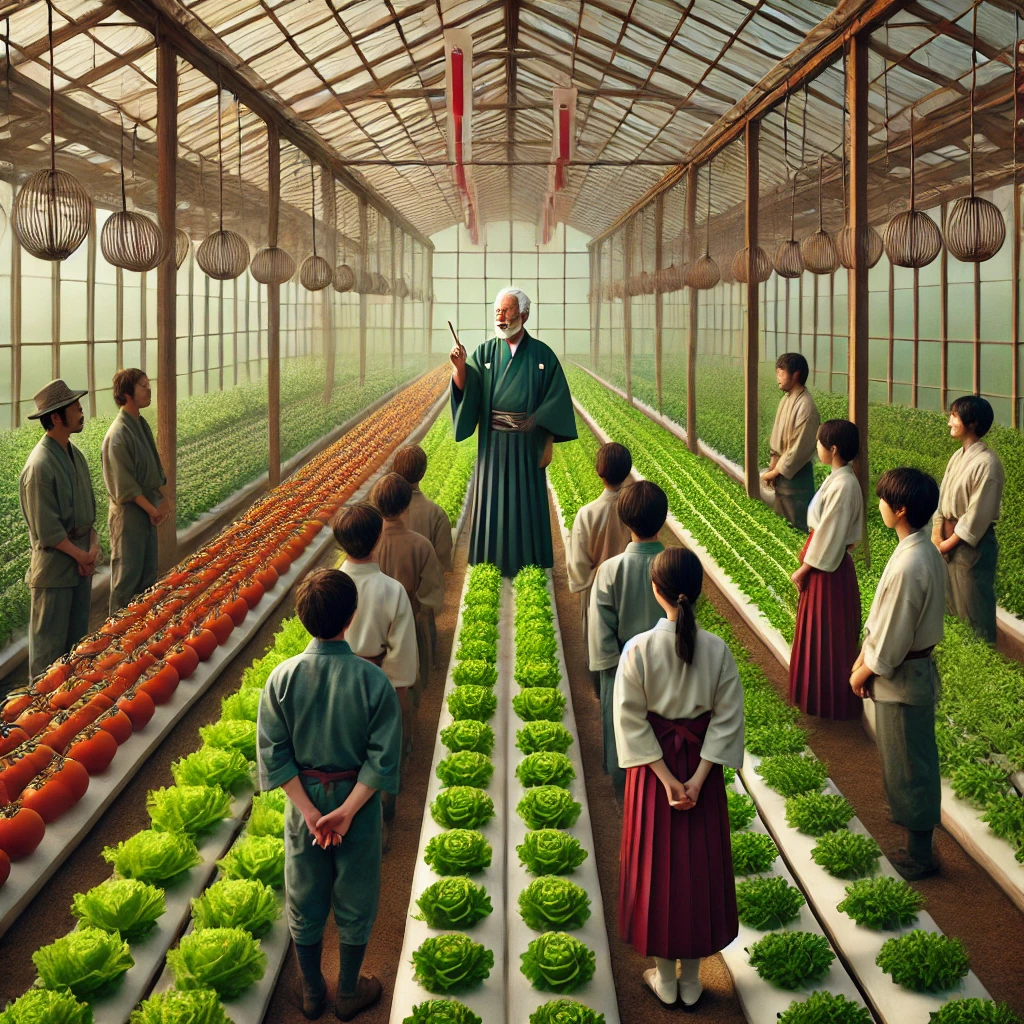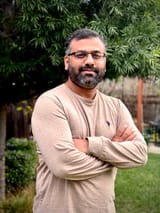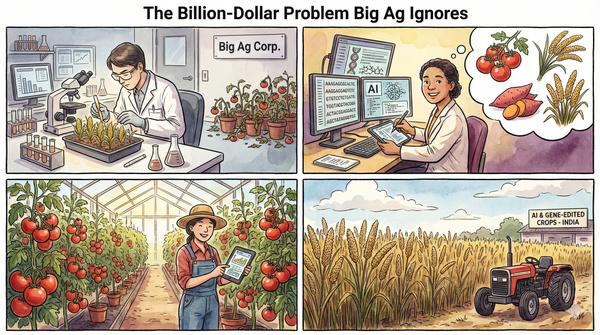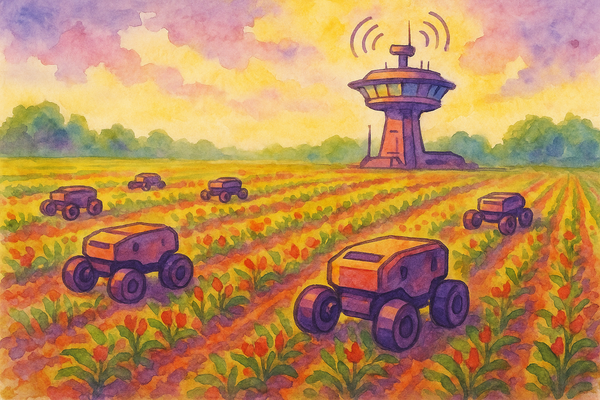At least Ellison didn't do vertical farms
What lessons can we learn from Sensei Ag?

This week’s edition looks at the Sensei Ag debacle. But before we get there, let us get through some announcements.
Announcements
- SFTW Convos will return on Wednesday with my conversation with Michael Stern, ex-CEO of The Climate Corporation, post its acquisition by Monsanto. We have heard David Friedberg’s side of the story in his interview with Louisa Burwood-Taylor two years ago. This conversation will shed some light on Monsanto’s perspective on the acquisition, what worked and what didn’t. Ask your friends and colleagues to subscribe, if they want to get this in their Inbox on Wednesday.
- Most enterprise GenAI projects get stuck in proof-of-concept land. SFTW released a white paper on Wednesday, which provides a practical guide on how to break through the POC wall with case studies from four different organizations. You can get the free white paper here: “POC to OMG! The Realities of Deploying GenAI at the Farm Gate”
- I will be chairing the opening fireside chat at the pre-summit at World Agritech “AI in agriculture forum” on March 10th.
- I will be chairing the “AI / GenAI: Transforming Legacy Industries to Improve Customer Outcomes” breakout session on March 11th at the World Agritech Summit with Pratik Desai (Kissan AI), Sachi Desai (Bayer), and Rikin Gandhi (Digital Green)
Sensei farms
A few days ago, the Wall Street Journal reported “Larry Ellison’s Half-Billion-Dollar Quest to Change Farming Has Been a Bust” (paywalled article)
His Sensei Ag company hasn’t succeeded in boosting output and nutrition in its greenhouses with AI, robotics and software.
Larry Ellison is a famous technology entrepreneur and billionaire, who is the Executive Chairman of Oracle and its CTO. He was instrumental in bringing Oracle database technology to the market. Interestingly enough, his Wikipedia page did not have any mention of farming or agriculture among his many activities.
He has spent $ 500 million (according to WSJ), which I guess is not a large amount for someone to go and modify their Wikipedia page. So I went ahead and edited his page and added a very short paragraph about his interest in farming. (Hopefully the change will stick, though with LLM technology, the importance of Wikipedia is going down/has gone down.)
The story has definitely had a strong reaction within the AgTech community. The reactions have been typical and not very surprising. Here is a paraphrased example of a reaction.
Tech bros believe they can solve all problems with technology, while innovation comes from experienced people.
This is the absolutely wrong lesson to learn from the Sensei Ag experience. This is an “us vs. them” attitude, which is not helpful at all.
It completely misses how innovation happens.
Innovation requires capital, domain expertise, human resources, right business, GTM, and distribution models, a lot of patience, and some amount of luck.
In the US, only 1-2% of the population is involved in farming and agriculture. It is extremely naive and dangerous to expect that all innovation has to and can only come from the 1-2% of the population.
There are innumerable examples of people from outside a given industry who will come in with a new perspective, a fresh pair of eyes, fresh capital (this is especially important, when the overall funding is down in AgTech), new skills and a new approach to solve a particular problem. They obviously need to work with and learn from people who have domain expertise to get a deeper understanding of the problems.
This is a cliched example but it is relevant - Henry Ford and “faster horses” and all that.
The word Sensei means a “teacher”, especially in a martial arts context.

Image generated by ChatGPT: “A Sensei (teacher) teaching about growing lettuce and tomatoes in a greenhouse”
Yes, Larry Ellison probably burnt through $ 500 million on this project. But what can we learn from the Sensei Ag experience? (Sensei Ag still continues to be a food business with operations in Ontario, Canada and Lanai).
What are the lessons?
Start from the problem you are trying to solve and the outcomes you hope to achieve
Larry Ellison started with a grand desire to “change how food is grown” and to “make the world a better place.” This is a tall ambition, which is often needed to drive meaningful change. It is not clear what were the intermediate steps to get to whatever was envisioned as the way to grow food in a different way.
Sensei Ag had promised AI-powered greenhouses, sophisticated sensors, and robotic harvesting systems.
But the technologies mentioned above are enablers to do something. They tell you potential means, but do not tell you anything about the ends or the outcomes you are trying to get to. The use of these technologies does not tell you anything about how you are “changing how food is grown.” It does even tell you if these are potential intermediate steps to get to some promised land.
Over the years, with many missteps the team has tempered their ambitions and have decided to provide fresh produce like lettuce and tomatoes in Lanai, as Hawaiian islands import most of their food. They have become a significant producer of lettuce and cherry tomatoes in Hawaii, though the venture has pivoted away from its initial world-changing ambitions to focus on agricultural management software and piloting systems in Southern California.
The Sensei team is focused on delivering an elevated flavor experience and high quality produce at reasonable prices to local grocery stores and restaurants. With a change in the problem you are trying to solve, you can change the outcomes you are going for and align your team and resources accordingly.
At least Ellison didn’t try vertical farming!
Don’t hire Dr. Phil to solve your farming problem
The day-to-day business of the company was managed by a medical doctor out of Boston and early on, they had very few people with any experience in building greenhouses or farming working with them. The company's leadership included tech veterans with no commercial farming experience, highlighting that domain expertise matters just as much as innovation.
The team made uninformed decisions, which would have not been made if they had someone with at least some farming experience with a voice and a seat at the table. For example, they intermixed mature plants and young plants, which caused pests to spread.
The greenhouses designed and built did not meet basic professional standards, did not understand the local conditions of high winds and humidity, and lacked connectivity for all the tech to work. The greenhouses ended up being basic and unsophisticated.
All of these problems were very easily avoidable, if they had spent a little bit of their $ 500 million on getting people who knew what they were doing.
Try to understand the economics of your business
Your initial attempts might not be profitable on a unit economics basis, but do you have a path to get there in an amount of time and budget, which you can support? According to the WSJ Ellison has not pushed to make a profit, but if you are running a business, and don’t have the billions of dollars like Ellison, you want to make it economically viable to stay in business and grow.
The Sensei team thought about growing expensive fruit which people might want to buy and thought about a $ 100 watermelon!! The cost of a watermelon is less than $ 5 in a typical grocery store. They thought people would pay $ 100 for extremely high-quality, sweet watermelons.
If you want to sell a $ 100 watermelon, it needs to have some other qualities beyond taste, which would make someone put down $ 100 for the watermelon. Your pool of buyers will be limited. For example, there has been an online brouhaha about the $ 19 strawberry sold by the Erehwon stores in Los Angeles. Buying an expensive strawberry could be a status symbol and could be used for signalling purposes by prospective buyers.
In Japan, there’s a farming concept called “hatsumono” (translates to “first of season”). Take any produce (cucumber, tomato) and the first farmer to market fetches multiples of the average price and gets all the media fanfare. Strawberries are an extreme example: the traditional growing season starts in Spring (April-May). But the race to get to market first has made strawberries a winter-time specialty in Japan (particularly around Christmas).
In this case, there is additional value in getting the “first of season” strawberry, and the strawberry producer can charge more beyond just having a sweet, high quality strawberry.
The Sensei team did not have any such additional value and so they had to fall back to providing lettuce and cherry tomatoes at reasonable prices to local grocery stores and restaurants in Lanai.
Run small experiments to learn and adjust
Even when you are embarking on a world changing mission, it helps to run small experiments to test out your hypothesis. You want to build greenhouses in Lanai? Do not blindly take the greenhouses designed for Israeli deserts and try to make them work in Hawaii’s humidity.
You want to use solar panels for power? At least run some simple experiments and look at weather data to see if you are going to get enough sunlight through the year. Run some small experiments to see if your solar panels will survive in weather conditions like wind? Will corrosive salty and humid air have an impact on the efficiency and lifespan of solar panels?
For all your fancy robotics, and sensors to work, will you have enough connectivity on a remote island like Lanai? What are the minimum set of capabilities you need to run a greenhouse which can work on Lanai?
Most of the problems with Sensei could have been avoided by running small experiments. The Sensei team could have learnt all of this by spending not more than $ 10 million, instead of the close to half a billion dollars.
Be clear about whether you are in the technology business or the growing food business
Technology alone can't solve agricultural challenges. The role of technology in agriculture is to be an enabler. You have to understand the fundamentals first and then apply technology where it truly adds value.
Time and again, companies make the mistake of leading with the technology, vs. why should the customer care, and how are you making their life and their farming operation different because of your product.
The right lesson to learn from the Sensei experiment is not that innovation comes only from insiders, but basics matter, irrespective of whether you are from the industry or from outside the industry.
At least let us learn the right lessons from these failed experiments.





